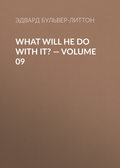
Эдвард Бульвер-Литтон
Zicci — Volume 02
BOOK 2
CHAPTER X
Merton and the Italians arrived in safety at the spot where they had left the mules; and not till they had recovered their own alarm and breath did they think of Glyndon. But then, as the minutes passed and he appeared not, Merton—whose heart was as good, at least, as human hearts are in general—grew seriously alarmed. He insisted on returning to search for his friend, and by dint of prodigal promises prevailed at last on the guide to accompany him. The lower part of the mountain lay calm and white in the starlight; and the guide's practised eye could discern all objects on the surface, at a considerable distance. They had not, however, gone very far before they perceived two forms slowly approaching towards them.
As they came near, Merton recognized the form of his friend. "Thank Heaven, he is safe!" he cried, turning to the guide.
"Holy angels befriend us!" said the Italian, trembling; "behold the very being that crossed me last Sabbath night. It is he, but his face is human now!"
"Signor Inglese," said the voice of Zicci as Glyndon, pale, wan, and silent, returned passively the joyous greeting of Merton,—" Signor Inglese, I told your friend we should meet to-night; you see you have not foiled my prediction."
"But how, but where?" stammered Merton, in great confusion and surprise.
"I found your friend stretched on the ground, overpowered by the mephitic exhalation of the crater. I bore him to a purer atmosphere; and as I know the mountain well, I have conducted him safely to you. This is all our history. You see, sir, that were it not for that prophecy which you desired to frustrate, your friend would, ere this time, have been a corpse; one minute more, and the vapor had done its work. Adieu! good night and pleasant dreams."
"But, my preserver, you will not leave us," said Glyndon, anxiously, and speaking for the first time. "Will you not return with us?"
Zicci paused, and drew Glyndon aside. "Young man," said he, gravely, "it is necessary that we should again meet to-night. It is necessary that you should, ere the first hour of morning, decide on your fate. Will you marry Isabel di Pisani, or lose her forever? Consult not your friend; he is sensible and wise, but not now is his wisdom needed. There are times in life when from the imagination, and not the reason, should wisdom come,—this for you is one of them. I ask not your answer now. Collect your thoughts, recover your jaded and scattered spirits. It wants two hours of midnight: at midnight I will be with you!"
"Incomprehensible being," replied the Englishman, "I would leave the life you have preserved in your own hands. But since I have known you, my whole nature has changed. A fiercer desire than that of love burns in my veins,—the desire, not to resemble, but to surpass my kind; the desire to penetrate and to share the secret of your own existence; the desire of a preternatural knowledge and unearthly power. Instruct me, school me, make me thine; and I surrender to thee at once, and without a murmur, the woman that, till I saw thee, I would have defied a world to obtain."
"I ask not the sacrifice, Glyndon," replied Zicci, coldly, yet mildly, "yet—shall I own it to thee?—I am touched by the devotion I have inspired. I sicken for human companionship, sympathy, and friendship; yet I dread to share them, for bold must be the man who can partake my existence and enjoy my confidence. Once more I say to thee, in compassion and in warning, the choice of life is in thy hands,—to- morrow it will be too late. On the one hand, Isabel, a tranquil home, a happy and serene life; on the other hand all is darkness, darkness that even this eye cannot penetrate."
"But thou hast told me that if I wed Isabel I must be contented to be obscure; and if I refuse, that knowledge and power may be mine."
"Vain man! knowledge and power are not happiness."
"But they are better than happiness. Say, if I marry Isabel, wilt thou be my master, my guide? Say this, and I am resolved."
"Never! It is only the lonely at heart, the restless, the desperate, that may be my pupils."
"Then I renounce her! I renounce love, I renounce happiness. Welcome solitude, welcome despair, if they are the entrances to thy dark and sublime secret."
"I will not take thy answer now; at midnight thou shalt give it in one word,—ay, or no! Farewell till then!"
The mystic waved his hand, and descending rapidly, was seen no more.
Glyndon rejoined his impatient and wondering friend; but Merton, gazing on his face, saw that a great change had passed there. The flexile and dubious expression of youth was forever gone; the features were locked, rigid, and stern; and so faded was the natural bloom that an hour seemed to have done the work of years.
CHAPTER, XI
On returning from Vesuvius or Pompeii you enter Naples through its most animated, its most Neapolitan quarter, through that quarter in which Modern life most closely resembles the Ancient, and in which, when, on a fair day, the thoroughfare swarms alike with Indolence and Trade, you are impressed at once with the recollection of that restless, lively race from which the population of Naples derives its origin; so that in one day you may see at Pompeii the habitations of a remote age, and on the Mole at Naples you may imagine you behold the very beings with which those habitations had been peopled. The language of words is dead, but the language of gestures remains little impaired. A fisherman,— peasant, of Naples will explain to you the motions, the attitudes, the gestures of the figures painted on the antique vases better than the most learned antiquary of Gottingen or Leipsic.
But now, as the Englishmen rode slowly through the deserted streets, lighted but by the lamps of heaven, all the gayety of the day was hushed and breathless. Here and there, stretched under a portico or a dingy booth, were sleeping groups of houseless lazzaroni,—a tribe now happily merging this indolent individuality amidst an energetic and active population.
The Englishmen rode on in silence, for Glyndon neither appeared to heed or hear the questions and comments of Merton, and Merton himself was almost as weary as the jaded animal he bestrode.
Suddenly the silence of earth and ocean was broken by the sound of a distant clock, that proclaimed the last hour of night. Glyndon started from his revery, and looked anxiously around. As the final stroke died, the noise of hoofs rang on the broad stones of the pavement, and from a narrow street to the right emerged the form of a solitary horseman. He neared the Englishmen, and Glyndon recognized the features and mien of Zicci.
"What! do we meet again, signor?" said Merton, in a vexed but drowsy tone.
"Your friend and I have business together," replied Zicci, as he wheeled his powerful and fiery steed to the side of Glyndon; "but it will be soon transacted. Perhaps you, sir, will ride on to your hotel."
"Alone?"
"There is no danger," returned Zicci, with a slight expression of disdain in his voice.
"None to me, but to Glyndon?"
"Danger from me? Ah! perhaps you are right."
"Go on, my dear Merton," said Glyndon. "I will join you before you reach the hotel."
Merton nodded, whistled, and pushed his horse into a kind of amble.
"Now your answer,—quick."
"I have decided: the love of Isabel has vanished from my heart. The pursuit is over."
"You have decided?"
"I have."
"Adieu! join your friend."
Zicci gave the rein to his horse; it sprang forward with a bound; the sparks flew from its hoofs, and horse and rider disappeared amidst the shadows of the street whence they had emerged.
Merton was surprised to see his friend by his side, a minute after they had parted.
"What business can you have with Zicci? Will you not confide in me?"
"Merton, do not ask me to-night; I am in a dream."
"I do not wonder at it, for even I am in a sleep. Let us push on."
In the retirement of his chamber, Glyndon sought to recollect his thoughts. He sat down on the foot of his bed and pressed his hands tightly to his throbbing temples. The events of the last few hours, the apparition of the gigantic and shadowy Companion of the Mystic amidst the fires and clouds of Vesuvius, the strange encounter with Zicci himself on a spot in which he could never have calculated on finding Glyndon, filled his mind with emotions, in which terror and awe the least prevailed. A fire, the train of which had long been laid, was lighted at his heart,—the asbestos fire that, once lit, is never to be quenched. All his early aspiration, his young ambition, his longings for the laurel, were mingled in one passionate yearning to overpass the bounds of the common knowledge of man, and reach that solemn spot, between two worlds, on which the mysterious stranger appeared to have fixed his home.
Far from recalling with renewed affright the remembrance of the apparition that had so appalled him, the recollection only served to kindle and concentrate his curiosity into a burning focus. He had said aright,—love had vanished from his heart; there was no longer a serene space amidst its disordered elements for human affection to move and breathe. The enthusiast was rapt from this earth; and he would have surrendered all that beauty ever promised, that mortal hope ever whispered, for one hour with Zicci beyond the portals of the visible world.
He rose, oppressed and fevered with the new thoughts that raged within him, and threw open his casement for air. The ocean lay suffused in the starry light, and the stillness of the heavens never more eloquently preached the morality of repose to the madness of earthly passions. But such was Glyndon's mood that their very hush only served to deepen the wild desires that preyed upon his soul. And the solemn stars, that are mysteries in themselves, seemed by a kindred sympathy to agitate the wings of the spirit no longer contented with its cage. As he gazed, a star shot from its brethren and vanished from the depth of space!
CHAPTER XII
The sleep of Glyndon that night was unusually profound, and the sun streamed full upon his eyes as he opened them to the day. He rose refreshed, and with a strange sentiment of calmness, that seemed more the result of resolution than exhaustion. The incidents and emotions of the past night had settled into distinct and clear impressions. He thought of them but slightly,—he thought rather of the future. He was as one of the Initiated in the old Egyptian Mysteries, who have crossed the Gate only to look more ardently for the Penetralia.
He dressed himself, and was relieved to find that Merton had joined a party of his countrymen on an excursion to Ischia. He spent the heat of noon in thoughtful solitude, and gradually the image of Isabel returned to his heart. It was a holy—for it was a human—image; he had resigned her, and he repented. The light of day served, if not to dissipate, at least to sober, the turbulence and fervor of the preceding night. But was it indeed too late to retract his resolve? "Too late!" terrible words! Of what do we not repent, when the Ghost of the Deed returns to us to say, "Thou hast no recall?"
He started impatiently from his seat, seized his hat and sword, and strode with rapid steps to the humble abode of the actress.
The distance was considerable, and the air oppressive. Glyndon arrived at the door breathless and heated. he knocked, no answer came; he lifted the latch and entered. No sound, no sight of life, met his ear and eye. In the front chamber, on a table, lay the guitar of the actress and some manuscript parts in plays. He paused, and summoning courage, tapped at the door which seemed to lead into the inner apartment. The door was ajar; and hearing no sound within, he pushed it open. It was the sleeping chamber of the young actress,—that holiest ground to a lover. And well did the place become the presiding deity: none of the tawdry finery of the Profession was visible on the one hand, none of the slovenly disorder common to the humbler classes of the South on the other. All was pure and simple; even the ornaments were those of an innocent refinement,—a few books placed carefully on shelves, a few half-faded flowers in an earthen vase which was modelled and painted in the Etruscan fashion. The sunlight streamed over the snowy draperies of the bed, and a few articles of clothing, neatly folded, on the chair beside it. Isabel was not there; and Glyndon, as he gazed around, observed that the casement which opened to the ground was wrenched and broken, and several fragments of the shattered glass lay below. The light flashed at once upon Glyndon's mind,—the ravisher had borne away his prize. The ominous words of Zicci were fulfilled: it was too late! Wretch that he was, perhaps he might have saved her! But the nurse,— was she gone also? He made the house resound with the name of Gionetta, but there was not even an echo to reply. He resolved to repair at once to the abode of Zicci. On arriving at the palace of the Corsican, he was informed that the signor was gone to the banquet of the Prince di —, and would not return until late. He turned in dismay from the door, and perceived the heavy carriage of the Count Cetoxa rolling along the narrow street. Cetoxa recognized him and stopped the carriage.
"Ah my dear Signor Glyndon," said he, leaning out of the window, "and how goes your health? You heard the news?"
"What news?" asked Glyndon, mechanically.
"Why, the beautiful actress,—the wonder of Naples! I always thought she would have good luck."
"Well, well, what of her?"
"The Prince di— has taken a prodigious fancy to her, and has carried her to his own palace. The Court is a little scandalized."
"The villain! by force?"
"Force! Ha! ha! my dear signor, what need of force to persuade an actress to accept the splendid protection of one of the wealthiest noblemen in Italy? Oh, no! you may be sure she went willingly enough. I only just heard the news: the prince himself proclaimed his triumph this morning, and the accommodating Mascari has been permitted to circulate it. I hope the connection will not last long, or we shall lose our best singer. Addio!"
Glyndon stood mute and motionless. He knew not what to think, to believe, or how to act. Even Merton was not at hand to advise him. His conscience smote him bitterly; and half in despair, half in the courageous wrath of jealousy, he resolved to repair to the palace of the prince himself, and demand his captive in the face of his assembled guests.







